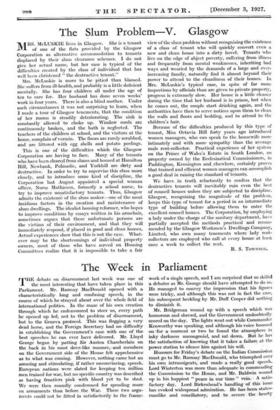The Slum Problem—V. Glasgow M RS. MeLUSKIE lives in Glasgow. She
is -a tenant of one of the flats provided by the Glasgow Corporation as alternative accommodation to tenants displaced by their slum clearance schemes. I do not give her actual name, but her case is typical of the difficulties created by the class of individual that has well been christened " the destructive tenant."
Mrs. McLuskie is more to be pitied than blamed. She suffers from ill-health, and probably is a little deficient mentally. She has four children all under the age of ten to care for. Her husband has done seven weeks' work in four years. There is also a blind mother. Under such circumstances it was not surprising to learn, when I made a tour of Glasgow tenements, that the condition of her rooms is steadily deteriorating. The sink is constantly allowed to choke up. Window cords are continuously broken, and the bath is neglected. The teachers of the children at school, and the visitors at the home, complain of vermin. The floors are rarely scrubbed, and are littered with egg shells and potato peelings.
This is one of the difficulties which the Glasgow Corporation are having to face. Many of the tenants who have been cleared from slums and housed at Hamilton Hill, Newbank, Polmadie, and Yorkhill are dirty and destructive. In order to try to supervise this class more closely, and to introduce some kind of discipline, ..the Corporation last August appointed a special woman officer, Nurse Mathieson, formerly a school nurse, to try to improye unsatisfactory tenants. Thus, Glasgow admits the existence of the slum maker—one of the most insidious factors in the creation and maintenance of slum dwellings. The idealist housing reformer, who hopes to improve conditions by essays written in his armchairs sometimes argues _ that these unfortunate persons are the victims of their environment, and that .they will immediately respond, if placed in good and clean houses, Actual experiences show that this is not the case. What7 ever may be the shortcomings of individual property owners, most of those who have served on Housing Committees realize that it is impossible to take a fair view of the shun problem without recognizing the existence of a class of tenant who will quickly convert even a new and clean house into a dirty hovel; Tenants who live on the edge of abject poverty, suffering from illness and frequently from mental weaknesses, inheriting bad ways and wearied by the demands of a large and ever- increasing family, naturally find it almost beyond their power to attend to the cleanliness of their homes: In Mrs. McLuskie's typical case, in spite of far more inspections by officials than are given to private property, progress is extremely slow. Her house is a little cleaner during the time that her husband is in prison, but when he comes out, the couple start drinking again, and the authorities have then to serve notices upon them to clean the walls and floors and bedding, and to attend to the children's hair.
Because of the difficulties produced by this type of tenant, Miss Octavia Hill forty years ago introduced women managers, who can speak to the housewife more intimately and with more sympathy than the average male rent-collector. Practical experience of her system on the Prince of Wales's Estate in South London, on property owned by, the Ecclesiastical Commissioners, in Paddington, Kensington and elsewhere, certainly proves that trained and efficient women managers can accomplish a good deal in raising the standard of tenants.
We have _ in truth reluctantly to confess that the destructive tenants will inevitably ruin even the best of council houses unless they are subjected to discipline. Glasgow, recognizing the magnitude of the problem, keeps this type of tenant for a period in an intermediate type of huilcling before allowing them to enter the excellent council houses. The Corporation, by employing a lady under the charge of the sanitary department, have partially accepted the methods practised and recom- mended by the Glasgow Workmen's Dwellings Company, Limited, who own many tenements where lady rent- collectors are employed who call at every house at least once a week to collect the rent.
B. S. TOWNROE.










































































 Previous page
Previous page